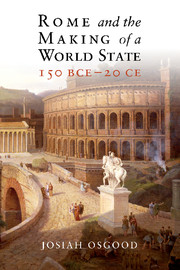Refine search
Actions for selected content:
23990 results in Ancient history
Abbreviations
-
- Book:
- Disabilities and the Disabled in the Roman World
- Published online:
- 23 March 2018
- Print publication:
- 12 April 2018, pp x-xii
-
- Chapter
- Export citation
Texts, Translations, and Abbreviations
-
- Book:
- Roman Political Thought
- Published online:
- 30 March 2018
- Print publication:
- 12 April 2018, pp xvi-xviii
-
- Chapter
- Export citation
4 - The Struggle for Reform (150–104 BCE)
-
- Book:
- Rome and the Making of a World State, 150 BCE–20 CE
- Published online:
- 11 April 2018
- Print publication:
- 12 April 2018, pp 48-67
-
- Chapter
- Export citation
Chapter 6 - Mobility Impairments
-
- Book:
- Disabilities and the Disabled in the Roman World
- Published online:
- 23 March 2018
- Print publication:
- 12 April 2018, pp 149-167
-
- Chapter
- Export citation
Chapter 2 - Liberty and Related Concepts
-
- Book:
- Roman Political Thought
- Published online:
- 30 March 2018
- Print publication:
- 12 April 2018, pp 37-62
-
- Chapter
- Export citation
Bibliography
-
- Book:
- Disabilities and the Disabled in the Roman World
- Published online:
- 23 March 2018
- Print publication:
- 12 April 2018, pp 192-214
-
- Chapter
- Export citation
9 - The Course of Empire: Provincial Government and Society (90–50 BCE)
-
- Book:
- Rome and the Making of a World State, 150 BCE–20 CE
- Published online:
- 11 April 2018
- Print publication:
- 12 April 2018, pp 144-159
-
- Chapter
- Export citation
Chapter 6 - Civil Religion
-
- Book:
- Roman Political Thought
- Published online:
- 30 March 2018
- Print publication:
- 12 April 2018, pp 136-165
-
- Chapter
- Export citation
General Index
-
- Book:
- Disabilities and the Disabled in the Roman World
- Published online:
- 23 March 2018
- Print publication:
- 12 April 2018, pp 215-219
-
- Chapter
- Export citation

Rome and the Making of a World State, 150 BCE–20 CE
-
- Published online:
- 11 April 2018
- Print publication:
- 12 April 2018
Introduction
-
-
- Book:
- Texts and Violence in the Roman World
- Published online:
- 29 March 2018
- Print publication:
- 05 April 2018, pp 1-43
-
- Chapter
- Export citation
Contents
-
- Book:
- Texts and Violence in the Roman World
- Published online:
- 29 March 2018
- Print publication:
- 05 April 2018, pp vii-viii
-
- Chapter
- Export citation
Abbreviations
-
- Book:
- Texts and Violence in the Roman World
- Published online:
- 29 March 2018
- Print publication:
- 05 April 2018, pp xv-xvi
-
- Chapter
- Export citation
Chapter 11 - Violence and the Christian Heroine
-
-
- Book:
- Texts and Violence in the Roman World
- Published online:
- 29 March 2018
- Print publication:
- 05 April 2018, pp 309-337
-
- Chapter
- Export citation
Copyright page
-
- Book:
- Texts and Violence in the Roman World
- Published online:
- 29 March 2018
- Print publication:
- 05 April 2018, pp iv-iv
-
- Chapter
- Export citation
Chapter 2 - Contemplating Violence
-
-
- Book:
- Texts and Violence in the Roman World
- Published online:
- 29 March 2018
- Print publication:
- 05 April 2018, pp 63-86
-
- Chapter
- Export citation
Chapter 6 - Tales of the Unexpurgated (Cert PG)
-
-
- Book:
- Texts and Violence in the Roman World
- Published online:
- 29 March 2018
- Print publication:
- 05 April 2018, pp 179-214
-
- Chapter
- Export citation
Notes on Contributors
-
- Book:
- Texts and Violence in the Roman World
- Published online:
- 29 March 2018
- Print publication:
- 05 April 2018, pp ix-xii
-
- Chapter
- Export citation
Chapter 5 - Violence and Resistance in Ovid’s Metamorphoses
-
-
- Book:
- Texts and Violence in the Roman World
- Published online:
- 29 March 2018
- Print publication:
- 05 April 2018, pp 140-178
-
- Chapter
- Export citation
Chapter 8 - Violence and Alienation in Lucan’s Pharsalia
-
-
- Book:
- Texts and Violence in the Roman World
- Published online:
- 29 March 2018
- Print publication:
- 05 April 2018, pp 246-268
-
- Chapter
- Export citation
